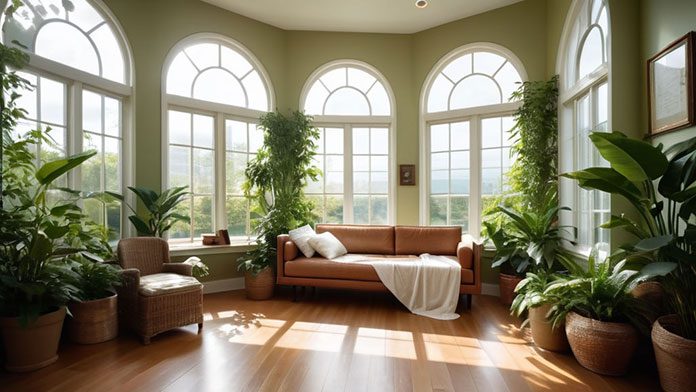Do you believe that reclusiveness is a mental illness?
It’s time to debunk this common myth. Contrary to popular belief, reclusiveness is not a psychiatric disorder. In fact, it is a behavior characterized by a preference for solitude and a desire to withdraw from social interactions.
Understanding the true nature of reclusiveness is crucial in dispelling misconceptions and promoting mental health. So let’s delve into the facts and explore the differences between reclusiveness and social anxiety, while discovering strategies to overcome it.
Table of Contents

Related Video: "Hypervigilance and How to Overcome It" by The School of Life
Main Points
– Reclusiveness is a behavioral pattern, not a mental illness.
– Reclusiveness should not be stigmatized or pathologized.
– Reclusiveness does not necessarily indicate social anxiety.
– Understanding the individual’s motivations is crucial for providing appropriate support.
The Definition of Reclusiveness

In this article, we’ll explore the definition of reclusiveness and debunk the myth surrounding it. Understanding the characteristics of reclusiveness is essential in order to understand its impact on individuals.
Reclusiveness refers to the tendency of an individual to avoid social interactions and isolate themselves from society. It’s important to note that reclusiveness isn’t the same as introversion or shyness, although they may share some similarities.
People who exhibit reclusive behavior often prefer solitude and may find social interactions overwhelming or draining. They may choose to withdraw from society due to various reasons such as anxiety, fear, or a desire for personal introspection. It’s crucial to recognize that reclusiveness isn’t a mental illness in itself. It’s a behavioral pattern that can be influenced by a variety of factors, including personality traits, past experiences, and individual preferences.
Exploring the societal perception of reclusiveness reveals a common misconception that individuals who are reclusive are inherently mentally ill or dangerous. This stereotype is perpetuated by media portrayals of recluses as eccentric or unstable. However, research suggests that reclusiveness isn’t necessarily indicative of mental illness but rather a personal choice or coping mechanism.
It’s important to challenge these stereotypes and encourage understanding and acceptance of individuals who prefer a more solitary lifestyle.
Understanding the Causes of Reclusiveness

To understand the causes of reclusiveness, you should consider various factors that contribute to an individual’s tendency to avoid social interactions and isolate themselves from society.
Reclusiveness can arise from a combination of genetic, environmental, and psychological factors. Research suggests that genetic predisposition may play a role in the development of reclusive behaviors. Studies have shown that certain genes related to anxiety and introversion may be associated with a higher likelihood of becoming reclusive.
Environmental factors also play a significant role in the development of reclusiveness. Traumatic experiences such as bullying, abuse, or loss can lead individuals to withdraw from social interactions as a protective mechanism. Additionally, living in a highly stressful or chaotic environment can contribute to feelings of anxiety and the desire to isolate oneself from others.
Psychological factors, such as social anxiety disorder or depression, can also contribute to reclusiveness. Individuals who experience intense fear or discomfort in social situations may choose to avoid them altogether. Similarly, individuals with depression may withdraw from social interactions due to feelings of low self-worth and a lack of interest in engaging with others.
It is important to note that reclusiveness isn’t a mental illness in and of itself, but rather a symptom of underlying issues. Therefore, treatment for reclusiveness focuses on addressing the underlying causes. This may involve therapy to address any psychological factors, as well as social support and gradual exposure to social situations to help individuals regain confidence and overcome their avoidance behaviors.
The Impact of Reclusiveness on Mental Health
You may be wondering how reclusiveness can impact your mental health. The long-term effects of social isolation can have a significant impact on your overall well-being. Research has shown that prolonged periods of reclusiveness can lead to various mental health issues, including depression, anxiety, and increased risk of developing other mental illnesses.
When you isolate yourself from social interactions, you miss out on the benefits of human connection. Social support plays a crucial role in maintaining mental health, as it provides emotional support, a sense of belonging, and opportunities for personal growth. Without these interactions, feelings of loneliness and isolation can intensify, leading to negative thoughts and emotions.
Furthermore, social isolation can also affect your cognitive abilities. Lack of social stimulation and engagement can contribute to cognitive decline, memory problems, and difficulties with problem-solving. It may also increase the risk of developing conditions such as dementia later in life.
It’s important to note that reclusiveness isn’t the same as introversion. Introverts may prefer solitude and recharge their energy through alone time, but they still maintain healthy social connections. Reclusiveness, on the other hand, involves long-term withdrawal from social interactions, which can have detrimental effects on mental health.
Common Misconceptions About Reclusiveness
One common misconception about reclusiveness is that it’s always indicative of a mental illness. While it’s true that some individuals who choose to live in isolation may have underlying mental health issues, it’s important to recognize that reclusiveness itself isn’t a mental illness.
In fact, there are many common misconceptions surrounding reclusiveness that contribute to the stigma surrounding this lifestyle choice.
Here are some misconceptions about reclusiveness:
– Reclusiveness is synonymous with social anxiety or agoraphobia.
– All reclusive individuals are lonely and unhappy.
– Reclusiveness is a sign of weakness or inability to cope with the outside world.
– Reclusive individuals are antisocial and lack social skills.
– Reclusiveness is a form of escapism or avoidance.
Contrary to these misconceptions, there can be benefits to reclusiveness in today’s society. For some individuals, living a reclusive lifestyle allows them to find solace, peace, and recharge their energy. It can provide a much-needed break from the constant stimulation and demands of the modern world. Reclusiveness can also foster creativity, introspection, and personal growth.
It is important to challenge these misconceptions and recognize that reclusiveness is a valid lifestyle choice that should be respected rather than stigmatized.
The Difference Between Reclusiveness and Social Anxiety
Both reclusiveness and social anxiety are characterized by avoidance, but they differ in the underlying motivations and experiences. While social anxiety is a recognized mental health disorder, reclusiveness is not classified as such. Social anxiety involves an intense fear or anxiety in social situations, leading individuals to avoid or endure such situations with intense distress. Reclusiveness, on the other hand, is a behavioral pattern characterized by a preference for solitude and a tendency to avoid social interactions. It is important to note that reclusiveness is not always a choice, but it can be a symptom of an underlying mental health condition, such as depression or anxiety disorders.
To further understand the differences between reclusiveness and social anxiety, let’s consider the table below:
| Reclusiveness | Social Anxiety | |
|---|---|---|
| Underlying Motivation | Preference for solitude | Fear and anxiety in social situations |
| Avoidance Behavior | Avoiding social interactions | Avoiding social situations due to fear |
| Emotional Experience | Contentment in solitude | Distress and discomfort in social situations |
As the table demonstrates, reclusiveness and social anxiety have distinct underlying motivations, avoidance behaviors, and emotional experiences. While reclusiveness can be a personal preference, social anxiety is driven by fear and anxiety. It is important to differentiate between the two to ensure appropriate support and understanding for individuals experiencing either condition.
Strategies for Overcoming Reclusiveness
To combat reclusiveness, it’s important to gradually step out of your comfort zone and engage in social activities. Overcoming isolation and building social connections can greatly improve your mental well-being and overall quality of life.
Here are some strategies that can help you in this process:
– Challenge negative thoughts: Replace self-defeating thoughts with positive affirmations. Remind yourself that social interactions can be enjoyable and rewarding.
– Start small: Begin by attending small gatherings or joining a club or organization that aligns with your interests. This can provide a structured and supportive environment for socializing.
– Seek professional help: Consider talking to a therapist or counselor who specializes in social anxiety or reclusiveness. They can provide guidance, support, and tools to help you overcome your fears and develop healthy social skills.
– Practice active listening: Show genuine interest in others by actively listening and engaging in conversations. This can help you build rapport and establish connections with others.
- Take care of yourself: Prioritize self-care activities such as exercise, getting enough sleep, and maintaining a balanced diet. Physical health plays a crucial role in mental well-being, and feeling good physically can boost your confidence in social situations.
Frequently Asked Questions
Can Reclusiveness Be Considered a Personality Trait Rather Than a Mental Illness?
Reclusiveness can be considered a personality trait rather than a mental illness. It is characterized by a preference for solitude and introspection. However, it is important to differentiate it from social anxiety or avoidance behaviors associated with mental health disorders.
Is Reclusiveness Always a Result of Trauma or Negative Experiences?
Reclusiveness doesn't always stem from trauma. It can also be a personal growth choice, allowing for introspection and solitude. It's important to consider individual motivations and experiences before labeling it as a mental illness.
Can Reclusiveness Be Inherited or Passed Down Through Generations?
Inherited reclusiveness is influenced by both genetic factors and cultural upbringing. While there is evidence to suggest a hereditary component, it is important to consider the environmental and social influences that can contribute to reclusive behaviors.
Are There Any Positive Aspects or Benefits to Being Reclusive?
Finding fulfillment in seclusion can provide a sense of peace, introspection, and creativity. The benefits of solitude include increased self-awareness, reduced stress, and the ability to focus on personal growth and hobbies.


